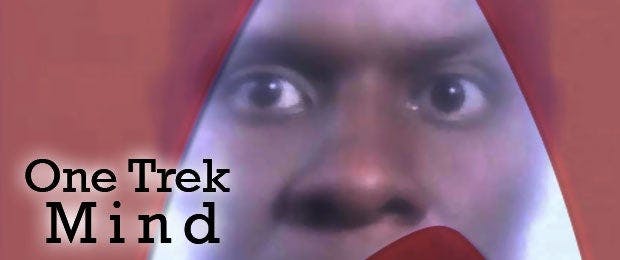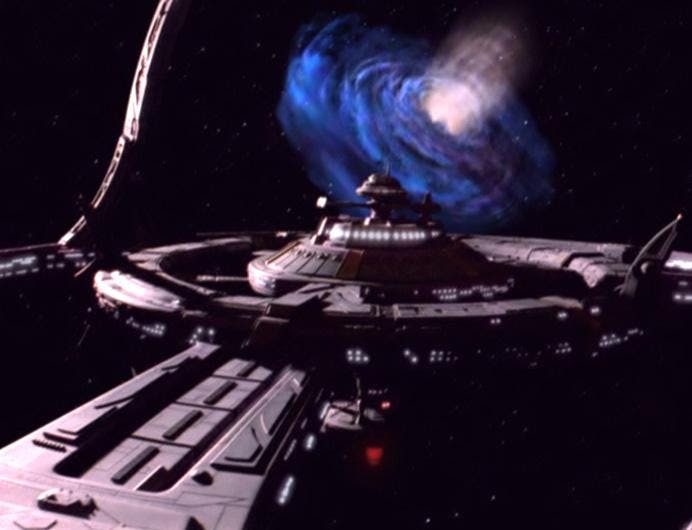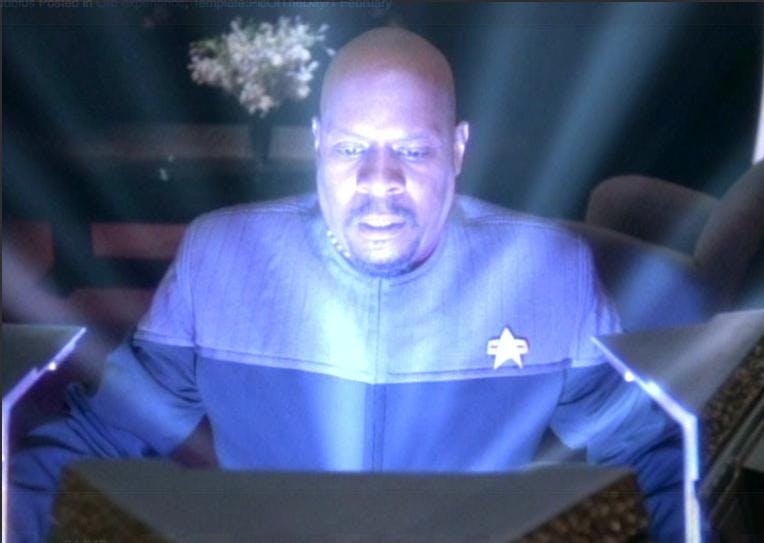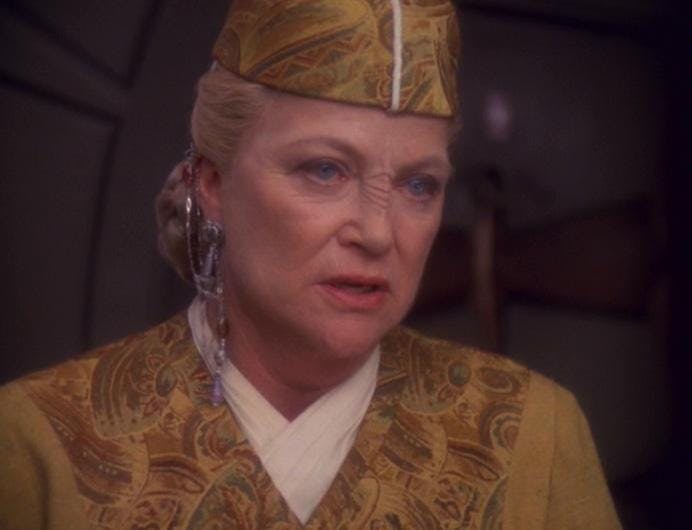Published Jan 1, 2014
One Trek Mind: Benjamin Sisko -- Son of a God?
One Trek Mind: Benjamin Sisko -- Son of a God?

To the hardcore, outlier Star Trek fan who answers “TOS vs. TNG” with a resounding “DS9!” the first week of January is a special time. January 2nd, 1993, was when we first met Captain (then Commander) Sisko, newly assigned to his diplomatically vague position of Federation liaison to the provisional Bajoran government at the end of the Cardassian Occupation.
Terok Nor, the Cardassians called it, but Deep Space Nine was the new name for the space station hovering near Bajor, out on the frontier of the Alpha Quadrant. What was soon recognized was how this distant location was to become the center of everything thanks to the discovery of the first stable wormhole.
Well, that's what the Federation folks called it. The Bajorans labelled it as something from their own myths: the Celestial Temple.
I should back up. From the Federation's perspective, it was Bajoran myth. To Bajorans, it was their religion.
Deep Space Nine broke a lot of ground for Star Trek, and one of the ways it differentiated itself was by doing something you're not really supposed to do on television or at dinner parties – it got into religion.
Star Trek to this point didn't get too involved in theology. It never stood up and said “we embrace science, not faith,” but that was always the general vibe. To be fair, certain TOS episodes toss in a blunt Judeo-Christian reference here and there. There's Kirk's remarks to the “Greek God” aliens in “Who Mourns for Adonais?” (“Mankind has no need for gods. We find the one quite adequate.”) There's also Uhura's revelation at the end of “Bread and Circuses” (“It's not the sun up in the sky. It's the Son of God.”) But even that moment quickly backpedals. Kirk talks about “Caesar and Christ” from an historic point of view; Bones mentions the “philosophy of love.” (I always wondered how William Shatner and Leonard Nimoy, two Jews, felt when first getting the pages for this script.)

Deep Space Nine equivocates far less. Bajor's Prophets live in the Celestial Temple, and while Federation skeptics politely refer to the non-corporal, four-dimensional beings as “Wormhole Aliens,” by the time we get to the end of the series, everyone is pretty convinced that these lifeforms are very, very powerful and prescient.
The way in which DS9 approached Bajor's religion was always, to my mind, part of the admirable, Rainbow Coalition-like tolerance in all of Trek. When the Bajoran religious leader Vedek (future Kai) Winn accuses Keiko O'Brien of being blasphemous, the station educator lays it right out for her. “I don't teach Bajoran spiritual beliefs,” she says in “In The Hands of the Prophets.” “That's your job. Mine is to open the children's minds to history, to literature, to mathematics, to science.” Never does Keiko state that Bajorans shouldn't believe what they want to believe about the denizens of the Wormhole. “I respect that the Bajoran people believe [in the Prophets].”
It's a fine line the show has to walk, not just because one of our heroes (Major Kira) is a believer, but because the show itself, in the emerging “PC” years of the 1990s, was held up as a paragon of inclusiveness. (It was still something of a big deal to have an African-American as the central figure on the show.)
In DS9's first episode Sisko is welcomed by the Bajorans as a promised religious figure, an “Emissary.” He found the Celestial Temple (quite by accident) and then had an Orb Experience and spoke with the Prophets, who told him of his destiny. In time (by season seven) he'll be the protector of Bajor during the Reckoning.

At first, Sisko shrugs it off. He's almost a little annoyed by all of this – he doesn't even want to be at Deep Space Nine, though his duty and general good nature stop him from being dismissive to the point of being impolite.
In time, though, we'll learn that while Sisko's father is a Creole chef in New Orleans and his mother was actually possessed by a Prophet and forced to conceive a child. This is something of a reverse-Virgin Birth, in a way. When the Prophet left her body, Sisko's mother became despondent and abandoned the family. Not such nice behavior from the Prophets. (Kinda resembles those Greek Gods we talked about earlier.)
Q, of the Q Continuum, was often referred to “having the power of a God,” but this description from Picard and others always felt like it came with an understood, unspoken “but we know he's NOT a God” at the end. These are characters well aware of Clark's Third Law which states that “any sufficiently advanced technology is indistinguishable from magic.” Surely there must be REASONS that Q can do all the things he can do; we're just not scientifically advanced enough to understand them.

Kira, on the other hand, comes from a culture with a heavy religious emphasis. There's the Bajoran concept of “pagh,” not too dissimilar from “The Force” in Star Wars, but without the telekinesis. Enough exposure to Bajorans, the long-suffering tribe under the thumb of the Fascist Cardassians, and you begin to see how their faith manifested itself into a palpable thing – a unifying agent that aided them during the Resistance. Does this make the question of The Prophets' divinity “true?” Not necessary. But it does show how belief in The Prophets offered providence, which remains a unique aspect of DS9 in comparison to all the other series.
How did Sisko's eventual acceptance of being the Emissary of the Prophets sit with you? Did you find it to be an affirmation of Star Trek's open-mindedness, or did you ever wish someone would tell the Bajorans to take off their earrings and get with the times? Let me know your thoughts in the comments below.
